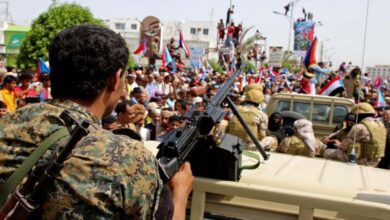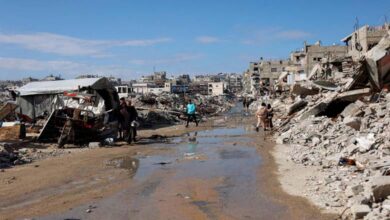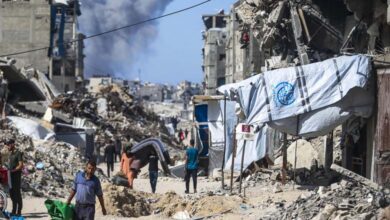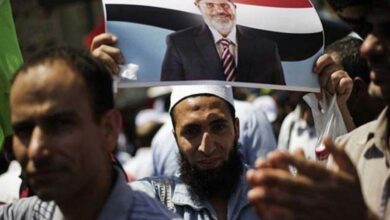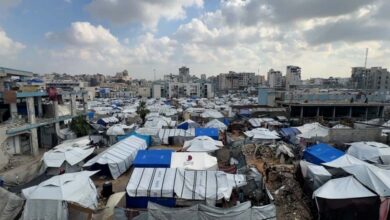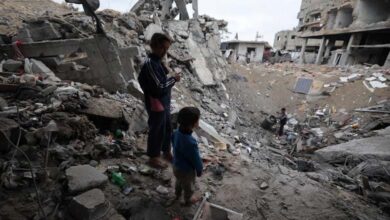The Ennahdha Movement exploits Gaza events to return to the streets that rejected It
The movement trades on the Palestinian cause by linking it to the prisoners of the Ennahdha in the raised slogans during all its protests under the banner of supporting Palestine

The Ennahdha movement seeks to mobilize support through all means and methods to attract attention and return to the political scene by exploiting the streets and the unlimited sympathy of Tunisians with the Palestinian cause. Despite the fact that its cards have been exposed due to its previous positions, which proved that its goal is to ride the wave of popular anger, just like what happened during the 2011 revolution.
In a statement published on its official Facebook page, the Ennahdha movement called on the authorities to expedite the revelation of the truth in the assassination of engineer Mohamed Zawari. It declared its support for calls to expedite the resolution of the assassination cases that shook the country and public opinion after the revolution, considering that they have been exploited in attempts to thwart the revolution and hinder genuine national reconciliation.
It is noteworthy that all political assassination crimes witnessed in Tunisia after the 2011 revolution occurred during the rule of the Ennahdha or its participation in governance. However, it ignores this fact in an attempt to shift responsibility to the current government, as the Ennahdha now represents the opposition and throws accusations in all directions to justify its previous mistakes, which Tunisians consider to be the cause of the current economic, social, and political situation.
The Ennahdha did not learn from past lessons when it failed to mobilize the streets by calling for protests against President Kais Saied.
The Ennahdha addressed the national march expected to be organized on Saturday, coinciding with the seventh anniversary of the assassination of Zawari. It called on the public to participate, emphasizing the “necessity of continuing the struggle for the Palestinian cause and the national issue to unleash all the energies of the people and overcome the state of weakness,” which it claimed was caused by the policies of the coup, calling for the release of all detainees and political prisoners.
Blatant exploitation of the Palestinian cause is evident in its connection to the prisoners of the Ennahdha movement in the raised slogans during all its protests held under the banner of supporting Palestine. The movement repeatedly raises placards with pictures of its detainees, demanding “freedom from Tunisian prisons to Palestine for the detained so-and-so,” adding the name of its leaders each time, and raising the slogan “freedom for everyone from Tunisia to Palestine.”
The Ennahdha called for participation in the march through its Facebook page and hundreds of sponsored pages affiliated with it, with a promotional video featuring various slogans, including “December 10, the Tunisian people write a new page in the history of the struggle against tyranny.”
On the same day, the movement’s page published a statement attributed to its leader, Rached Ghannouchi, condemning the aggression on Gaza and violations in Tunisia, expressing support for hunger strikes as a symbolic protest on December 10.
However, these resonant slogans no longer attract the attention of Tunisians, who consider them an exploitation of the Palestinian cause to convey the messages of the Ennahdha and its slogans related to its prisoners, including its former leader, who is pursued in cases related to terrorism in the counter-terrorism pole.
Among the slogans raised on December 10th, a striking one demanded criminalizing normalization: “The people want to criminalize normalization,” even though the Ennahdha itself, with its parliamentary majority at the time, was the first to reject the law criminalizing normalization with Israel. It has repealed it multiple times during its period of governance.
Many still remember the Ennahdha deputy Sahbi Atigue, who, in an interview on Hannibal TV in 2012, tried to justify his movement’s opposition to including the principle of criminalizing normalization with Israel in the new constitution. He claimed that they opposed this move based on the advice of Hamas leaders, mentioning by name Ismail Haniyeh and Khaled Meshaal. However, Hamas leadership quickly denied Atig’s statements, and he had no choice but to admit his lie in another statement, considering his previous statements as “incorrect conclusions.”
Reports indicate that Ghannouchi, during his visit to Washington in December 2011, visited the “Middle East Policy Institute,” considered the intellectual and ideological stronghold of the new conservatives and extremists sympathetic to the Zionist movement. The institute’s researcher, Martin Kramer, revealed that Ghannouchi held a closed session with them, in which he insisted on not recording and disclaimed his previous supportive positions for Hamas in Gaza and the Taliban in Afghanistan.
The magazine Wiki Standard, affiliated with conservatives, revealed that Ghannouchi made commitments during his session with the institute that the upcoming Tunisian constitution “will not include anti-Israel or anti-Zionist signals.”
Ghannouchi also attended the Davos Forum in 2012, where he was not the only representative of political Islam in the region. He was alongside Abdelilah Benkirane, the then-Moroccan Prime Minister and leader of the Moroccan Justice and Development Party. Both made a statement on the sidelines of the forum to Israel Radio, with Ghannouchi stating that “the future of his country’s relations with Israel is governed by reaching a solution to the Palestinian issue.”
Regarding the current Tunisians’ stance on political Islam, the French newspaper Le Figaro reported that Tunisian academics and activists consider political Islam to be the greatest disappointment for the Tunisian people. The Ennahdha, which began its collapse in the 2014 elections and then in 2019 without completely collapsing, has turned into absolute hatred for the Tunisians, who hold it responsible for the economic crisis in their country during the era of political Islam.
Le Figaro mentioned in an opinion article that Ghannouchi, imprisoned on charges of conspiring against the Tunisian state and exporting jihadists, was something unimaginable in the years following the so-called “Arab Spring.” The newspaper highlighted that the decisions of the Tunisian president enjoy widespread popular acceptance. Meanwhile, Le Monde praised President Kais Saied‘s continued efforts to rely on the army and police in his country against the interventions of the Muslim Brotherhood in politics and the ruling system.
Observers of the Tunisian political scene believe that with the imprisonment of Ghannouchi, freezing his assets and those of his group, closing the Ennahdha offices in all Tunisian provinces, and preventing all its meetings, their influence within Tunisia has diminished, and the noose has tightened around them. Therefore, they are trying to incite public opinion against the government by criticizing its policies and the current crisis, despite it being the result of the Ennahdha‘s own practices.
The Islamic movement claimed that the approval of the state budget and the sealing of the 2024 finance law, coinciding with Tunisia’s sovereign rating being downgraded by Fitch to the level of high-risk and unsustainable debt, proves the government’s failure throughout the current year to find solutions for budget financing or provide guarantees for the debts due in 2024.
They argued that this would exacerbate financing difficulties, waste investment and development opportunities, increase living difficulties, and undermine hope for any reform, improvement, or exit from the crisis.
The movement mentioned that it is not concerned with local and regional elections being prepared for amid the indifference of citizens burdened by the scarcity of essential goods and rising prices.
Ennahdha’s position does not differ from the practices of the Muslim Brotherhood in Arab countries that express their political goals and slogans through presumed sympathy for the Palestinian cause. Ennahdha is not far from the Jordanian Brotherhood, who have resorted to rallying against the official stance, indifferent to the sensitivity of the Jordanian position. They organized marches calling for the cessation of agreements with Israel while the Jordanian leadership and army face a campaign of skepticism about their position in the war on Gaza.



